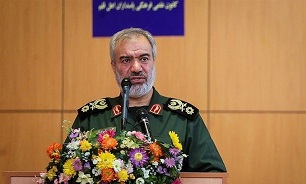IRGC Commander Highlights Iran’s Regional Power
 Addressing a conference in Tehran on Monday about the widespread support for the IRGC forces, Brigadier General Ali Fadavi pointed to the declining power of the US in the world and said, “In the early years after the (1979) victory of the Islamic Revolution, no country dared to oppose the US-led global hegemony, but today we see that very small countries openly oppose the US in the meetings of the UN Security Council.”
Addressing a conference in Tehran on Monday about the widespread support for the IRGC forces, Brigadier General Ali Fadavi pointed to the declining power of the US in the world and said, “In the early years after the (1979) victory of the Islamic Revolution, no country dared to oppose the US-led global hegemony, but today we see that very small countries openly oppose the US in the meetings of the UN Security Council.”
“Today, in the area of (Iran’s) regional achievements, there are tens of thousands of Lebanese Hezbollah forces around the borders of the Zionist regime, and this is something the Americans cannot stomach,” he added.
The US and Israel began the 33-day war to eliminate Hezbollah and prevent Iran from reaching its goals in the region but “suffered a terrible defeat” with the grace of God, the commander went on to say.
The Tel Aviv regime launched two wars on Lebanon in 2000 and 2006. About 1,200 Lebanese, most of them civilians, were killed in the 33-Day War of 2006.
On both occasions, however, Hezbollah resistance movement’s fighters defeated the Israeli forces and Tel Aviv was forced to retreat without achieving any of its objectives.
The conflict in 2006, also known as the July War, took place in Lebanon, northern parts of Occupied Palestine and the Golan Heights.
It started in July 2006, and continued until a United Nations-brokered ceasefire went into effect in the morning on August 14 that year, though it formally ended on September 8 when Israel lifted its naval blockade of Lebanon.
Message end/
